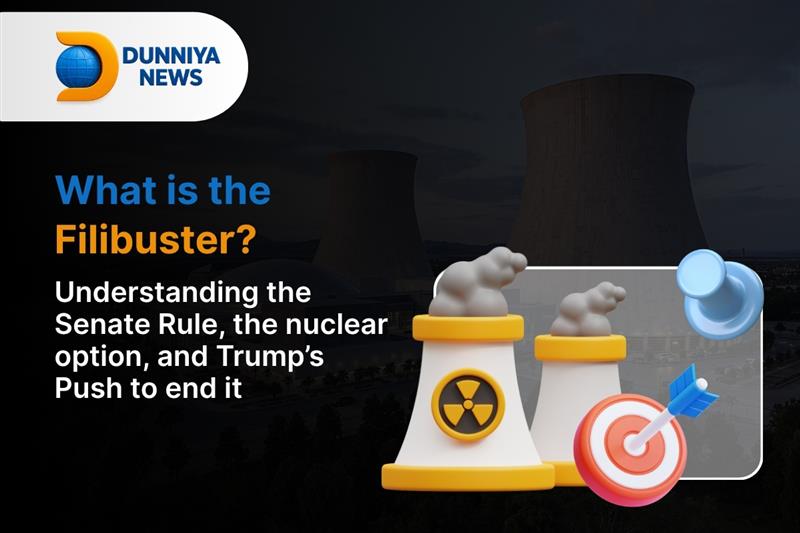
What Is the Filibuster? Understanding the Senate Rule, the Nuclear Option, and Trump’s Push to End It
What Is the Filibuster? Understanding the Senate Rule, the Nuclear Option, and Trump’s Push to End It
The Senate was designed and is still designed to be a deliberative organ that allows for extended discussion. It was and still is the case that senators were allowed to speak for as long as they wished. As a way to pass time, they would read books, recipes and other texts.
The filibuster in the U.S. Senate is a controversial and highly talked-about political tool. The word filibuster seems to be popular during heated debates and deadlocks. What is the filibuster, how does it function and why is this at the heart of the political fight in Washington?
How This Senate Rule Shapes American Politics and Lawmaking
Nowadays, senators don’t need to give long speeches to signal a filibuster. They need only announce their intention to object briefly, and the vote threshold for the legislation automatically increases. To break a filibuster, the Senate has to vote for cloture, which is a process where a group is allowed to end the debate.
This process requires 60 votes out of 100, meaning, even if the majority party has 51 seats, they still need 9 votes from members of the opposing party to end the debate and move to a final vote. This is also different from the House of Representatives, in which case there is a strict time limit on debate.
The Purpose of the Filibuster
Proponents claim the filibuster is needed to ensure extreme and dangerous legislation is not passed too quickly and that all parties are included in the law-making process. Supporters of the filibuster argue that it is to ensure the law-making process is not too rushed.
The opposite has been argued in that the filibuster is a tool of obstruction. The frustrations in the Senate have become so great that even common bills find themselves stuck in the legislative process. This is due to the over usage of the filibuster to stagnate legislation. This over usage of the filibuster is where the Senate has lost its functional order.
The Benefits and Drawbacks of filibuster
The filibuster is perceived by some as a means of providing equilibrium and stability in a government. No one party can fully control the Senate, which guarantees some form of cross party collaboration. They suggest that the absence of a filibuster would bring uncontrollable and dramatic changes in policies each time the Senate changes hands.
Others, however, suggest the filibuster is a relic of the past and claims it is job blocking. They cite the fact that it has consistently been utilized in order to stop the advancement of key legislation related to immigration, climate, and voting rights. It is viewed as an antiquated Senate rule that gives power to a small faction of senators to negate that which the majority wants.
What is the Nuclear Option in the Senate?
In debates about changing and/or abolishing the filibuster, the term “nuclear option” is used. It sounds dramatic, but it has nothing to do with armaments. It refers to a procedure that allows the senatorial majority to change the rules by a majority vote as opposed to the longstanding two-thirds majority rule.
How the Nuclear Option Works
Typically altering Senate rules would take 67 votes, which would be almost impossible to reach with a split Senate. The nuclear option lets the majority interpret the rules differently by stating a point of order and then voting to overturn the presiding officer’s ruling by a simple majority. Once it goes through, the rules are unofficially changed to accommodate a new precedent.
We have seen this happen before. In 2013 Senate Democrats got rid of the filibuster for most presidential nominations. This lets them get approved with a simple majority of votes. In 2017, Senate Republicans extended this to Supreme Court nominations. Because of this, cabinet officials and federal judges can now be approved with 51 votes instead of the previous 60 votes.
Legislation is the next frontier in this debate. The 60-vote rule still exists for the majority of bills, and there is momentum on both sides to change that. The Senate would be able to pass new legislation with a simple majority, which would significantly rework the way it functions, if the nuclear option is used on legislation.
Why It’s Called “Nuclear
“It’s called ‘nuclear option’ because it could have explosive political consequences.” It’s a one-way ticket to change how power is distributed in the Senate. Lawmakers tend to avoid such moves because they fear that it would trigger deeper political divides, making it even more likely that political opponents will change the rules every time they gain a slight edge in power.
Growing Division Among Senate Republicans
Once again, a political discussion in Washington went and turned into a frenzy. Some Republican senators agree that it is next to impossible to fulfill their promises to their voters due to the out-of-date rules. On the other hand some Republican senators warn that getting rid of the filibuster which allows endless debate on legislation can be disastrous. If the Democrats take full political power again they will be able to pass radical laws without the Republican party having a say.
Trump wants the filibuster gone and it shows the frustration that many people especially in the Republican party feel regarding the political standstill. Millions of federal workers and other citizens are suffering due to the current government shutdown. People who back Trump’s ideas argue that the Senate has a responsibility and there is no reason that rules should stand in the way.
Risks of Eliminating the Filibuster
People argue that getting rid of the filibuster will get rid of the last pieces of the structure that encourages cooperation in the opposing sides of the government. The Senate is meant to take the passions out of the legislation and to slow down the decision-making to allow power in the government to be shared. Taking this away is like getting rid of all the rules which can result in the government system being ruined due to constant changes in the laws.
A Divided Senate: How the Filibuster Fuels Political Gridlock in Washington
There is division within the Republican Party. Some of their senators think it is time to use the nuclear option to move ahead. Others think it would be setting a risky precedent. An argument can be made for the rule’s usefulness to Republicans at the moment but it can be of equal benefit to the Democrats in the future.
Democrats have a clearer position. From their perspective, the real answer to gridlock is not a change to the rules, but the willingness to negotiate and meet the opposing side for common ground.
The Broader Impact on American Democracy
With the ever divisive filibuster and the nuclear option, it can be challenging to view the discussion from the perspective of democracy in the United States as a whole. The filibuster creates deadlock, forcing people to work together, but it also creates a situation where nothing gets done. Eliminating it, and the options it presents for deadlock, would allow legislation to pass quickly but would leave a greater chance for extreme polarization to occur.
Without the filibuster, legislation, and in turn, laws of the land, can be passed by the majority party in the Senate, overriding the voices and votes of the opposition. While that may seem like a more effective system, it allows for greater division to be created as the political landscape of the country becomes charged. Repealing and replacing laws every time power shifts creates great instability.
For many years, similarly predictable, both parties positioned the filibuster as a waste of time, favored it when it served their purposes, and assumed it was constitutionally mandated.
What Happens Now?
The future of the filibuster remains tenuous. Trump’s renewed attention on it has somewhat galvanized Senate Republicans, but many remain wary. And even within a single party as followers of democracy, Republicans defend an alternative as S. P. of J. and prevail as S. P. of F. Republicans.
Each Republican’s party engenders a de facto filibuster as S. P. of J. prevails on politically coined, but non zero-sum, slogans. Each’s party is best, their selflessness pitched to gain dial on the S. P. of J. rest mandated S. P. of J.
When, as many exp, the U.S. passes a reform S. P. of J., the republic, as many exp, to constitutionally guaranteed, a framers democracy, the national S. P. of J. becomes a global standard.
Conclusion
The filibuster was viewed as a courtesy in congressional debate but is now viewed as a courtesy in congressional debate but is now a source of contention in American politics. Supporters believe it protects the rights of the minorities in the Senate while detractors label it a hindrance for progress.
With Donald Trump proposing the nuclear option, the United States is faced with a critical decision. Should the Senate adapt to a majoritarian system that will increase the likelihood of legislation passage or continue with the tradition of consensus building for legislation passage to eliminate political gridlock?
The consequences of this decision will affect the political balance of power the passage of legislation and the governance of the most powerful democracy in the world especially as it contends with internal polarity.
